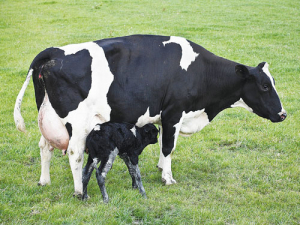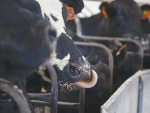Cows that are usually calm can become unpredictable after calving; always keep an eye on the cow and keep the calf between you and its mother.
Plan an escape route in case you need to get out of the way of a protective mother.
A well-stocked calving kit is essential and will save you making trips between the paddock and the shed.
Mothers and calves often get separated in the calving paddock and calves can hide in drains, hollows, hedges, and long grass, or they may walk under break fences, so it is important to take your time checking the paddock.
In cold, wet and windy weather calves will tend to walk in the direction of the wind.
Check a calf to see if it is alive and breathing, then check to see if it’s fit and healthy. Spray the calf’s navel in the paddock to help prevent it from getting sick.
Recording information about the cow and calf is important for farm records. Identifying calves in the paddock prevents confusion at the calf shed and helps track the age of calves.
Newborn calves can be heavy, wet and awkward to hold; handle and lift calves correctly to help prevent injuries to you and the calves.
Calves can be injured easily so take care when placing them on a trailer. A calf trailer should have enough room for all calves to lie down comfortably.
Overloading the trailer can lead to injuries and swollen navels; driving slowly helps keep you and the calves safe. Take care when driving on slopes because the trailer can become unstable.
Slow driving also allows any newly calved cows to follow the trailer.
Applying an easy-clean, non-slip material to the floor of the trailer can help make transportation safer and more comfortable for calves; regular cleaning and disinfection of the trailer reduces the risk of infections. Allowing the trailer to dry in the sun also helps kill bacteria.


















